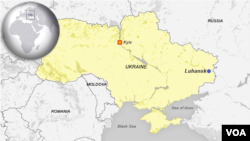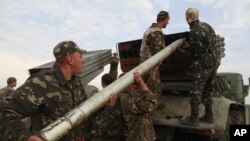Ukraine's President Petro Poroshenko is set to attend a summit next week with his Russian counterpart, Vladimir Putin, to address the crisis in eastern Ukraine.
Poroshenko's office described the August 26 summit in Minsk, the capital of Belarus, as an effort aimed at "stabilizing the situation in Ukraine." Top Poroshenko aide Valery Chaly said the talks will include Ukraine's expanding economic ties with the European Union and energy security.
A Kremlin statement said a number of meetings will take place at the summit, which includes EU representatives and the leaders of Belarus and Kazakhstan.
The meeting will be the first direct encounter between Poroshenko and Putin since their joint participation at a World War II anniversary observance in Normandy, France, in June.
The EU delegation will reportedly be led by the bloc's foreign policy chief, Catherine Ashton.
Ahead of the talks in Minsk, German Chancellor Angela Merkel is to meet with Poroshenko in Kyiv Saturday, her office anounced.
A top Poroshenko administration official said that the Minsk meeting presented a unique opportunity with regards to the conflict in eastern Ukraine.
“I’ll cautiously say it’s a chance to start a real negotiation process,” said Valery Chaly, Poroshenko’s deputy chief of staff.
Bodies of 17 civilians recovered
The Ukrainian government says it has recovered the bodies of 17 civilians who were in a convoy of vehicles fleeing Luhansk when they were struck by a missile Monday.
Security and Defense Council spokesman Andriy Lysenko said Tuesday efforts to recover more bodies have been suspended due to fighting in the war-torn eastern area.
Lysenko announced at a news conference in Kyiv late Monday that separatists had fired Grad rockets, supplied by Russia, at a convoy of civilians fleeing the besieged city of Luhansk.
Speaking Tuesday, he said women and children were among the dead but added it was impossible to ascertain how many may have died in the attack. Other Ukrainian officials said some of the dead were burned to death in their vehicles.
The separatists denied allegations they were behind the attack, although insurgent leaders don’t deny some kind of rocket attack took place Monday that led to civilian deaths.
But they accused Ukrainian government forces of being responsible for the deadly strike, claiming that Ukrainian troops routinely bomb roads.
US condemns shelling
The U.S. State Department condemned the shelling of the convoy but said it couldn't confirm who was responsible.
The death toll in Ukraine has risen sharply since April, when the Ukrainian army, supported by volunteer battalions, launched a counter-insurgency operation to try to liberate cities and towns seized by separatists in the country's eastern Donetsk and Luhansk regions.
Last week, the United Nations nearly doubled its estimate of the number of people killed in the conflict to 2,086, as of August 10.
Half are likely civilians, officials told VOA. They include 298 who died in the downing of a Malaysian commercial jet last month by a missile that Western governments have said was fired by rebels and supplied by Russia.
The U.N. blamed most civilian casualties on the separatists.
Some civilians in Donetsk and Luhansk - it isn’t clear how many - have died when Grad rockets struck their homes.
The rumble of rocket and mortar exchanges can be heard daily in both cities with episodic bombardments, most often at night or around dawn.
Trading blame
Ukrainian officials say they are only fighting a ground war and are not firing artillery towards residential areas. They claimed rebels are responsible for the bombings, conducting them for propaganda purposes to place the blame on Kyiv.
The accuracy of the claims of either side are difficult to verify.
VOA has heard Grads being launched from behind government lines and has been told by Ukrainian soldiers that insurgent mortar and rocket fire is answered with their own artillery.
Equally, VOA has traveled down roads in and out of Donetsk that have come under mortar fire from rebel positions.
Combatants from both sides are operating in residential areas, mixing with civilians, and the ordnance being used is old and far from accurate.
Ukraine bans Russian TV
Ukraine has suspended the rights of 14 Russian television channels, including Russia Today and Life News, to broadcast on cable networks in Ukraine, accusing them of spreading misinformation.
The channels are banned temporarily for “broadcasting propaganda of war and violence,” Ukrainian interior ministry official Anton Gerashenko said on Tuesday in a Facebook post – a medium often used by some Ukrainian officials.
Kyiv ready to compromise on gas
Ukraine's energy minister on Tuesday said Kyiv was ready to pay an interim price for Russian gas and criticized Russia's Gazprom for its unwillingness to negotiate.
“We are ready to talk about some kind of reasonable compromise price... but Gazprom is not taking part in the negotiation process,” Yuri Prodan said Tuesday.
In June, Ukraine said it was ready to pay a compromise price of $326 per 1,000 cubic meters of Russian natural gas for an interim 18-month period to allow time to end the pricing dispute with Moscow.
Russia has been charging Ukraine $485 per 1,000 cubic meters for natural gas, more than any other European customer.
Many observers see the price as political punishment for Ukraine’s newle-embraced West-ward orientation.
Jamie Dettmer contributed to this report from Ukraine. Some information provided by Reuters.








